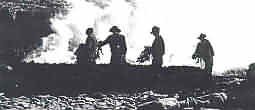Given the high concentrations of arsenic in seaweeds, up to 100 mg/kg, researchers from the Plant and Soil Science at the University of Aberdeen investigated the possibility that the kelp industry contributed to the arsenic contamination of these pristine environments.
 Background:
Background: Burning seaweed to produce kelp, valued for its high potash and soda content, was formerly a significant industry in remote coastal areas of Scotland and elsewhere (see Booth 1978/79, Chapman 1970). Kelp ash has been used in soap and glass production and as a raw material for iodine extraction.
The actual study:A series of laboratory-scale seaweed burning experiments was conducted, and analysis of the products using HPLC ICP-MS shows that at least 40% of the arsenic originally in the seaweed could have been released into the fumes.
The hypothesis that the burning process transforms arsenic from low toxicity arsenosugars in the original seaweeds (Fucus vesiculosus and Laminaria digitata) to highly toxic inorganic forms, predominantly arsenate, is consistent with As speciation analysis results.
A field study conducted on Westray, Orkney, once a major centre for kelp production, shows that elevated arsenic levels (10.7±3.0 mg kg
-1, compared to background levels of 1.7±0.2 mg kg
-1) persist in soils in the immediate vicinity of the kelp burning pits.
A model combining results from the burning experiments with data from historical records demonstrates the potential for arsenic deposition of 47 g ha
-1year
-1 on land adjacent to the main kelp burning location on Westray, and for arsenic concentrations exceeding current UK soil guideline values during the 50 year period of peak kelp production.
 The original study:
The original study:
G.J. Riekie, P.N. Williams, A. Raab, A.A. Meharg,
The potential for kelp manufacture to lead to arsenic pollution of remote Scottish islands, Chemosphere, 65/2 (2006) 332-342.
DOI: 10.1016/j.chemosphere.2006.02.025
 Related Information:
Related Information:
Andrew A. Meharg, Clare Deacon, Kevin J. Edwards, Margaret Donaldson, Donald A. Davidson, Christian Spring, C.M. Scrimgeour,
Jörg Feldmann, A. Raab,
Ancient manuring practices pollute arable soils at the St Kilda World Heritage Site, Scottish North Atlantic, Chemosphere, 64/11 (2006) 1818-1828.
DOI: 10.1016/j.chemosphere.2006.01.076
H. Castlehouse, C. Smith, R. Raab, C. Deacon, A.A. Meharg,
Jörg Feldmann,
Biotransformation and accumulation of arsenic in soil amended with seaweed, Environ. Sci. Technol., 37/5 (2003) 951-957.
DOI: 10.1021/ES026110I
Ernest Booth,
The history of the seaweed industry: Part 2 E.C.C.
Stanford and the iodine industry, Chemistry & Industry, 1978,
838-840

Ernest Booth,
The history of the seaweed industry: Part 3: The iodine industry, Chemistry & Industry, 1979, 52-55

V.J. Chapman,
Seaweeds & their uses, Methuen, London, 1970 (especially ch.2)
 Analytical methodology
Analytical methodology
S.G. Salgado, M.A. Quijano Nieto, M.M. Bonilla Simon,
Optimisation of sample treatment for arsenic speciation in alga samples by focussed sonication and ultrafiltration, Talanta, 68/5 (2006) 1522-1527.
DOI: 10.1016/j.talanta.2005.08.004
Andrea Raab, Peter Fecher,
Jörg Feldmann,
Determination of Arsenic in Algae - Results of an Interlaboratory Trial: Determination of Arsenic Species in the Water-Soluble Fraction, Mikrochim. Acta (Wien), 151/3-4 (2005) 153-166.
DOI: 10.1007/s00604-005-0395-7
Sathrugnan Karthikeyan, Shizuko Hirata,
Ion chromatography-inductively coupled plasma mass spectrometry determination of arsenic species in marine samples, Appl. Organomet. Chem., 18/7 (2004) 323-330.
DOI: 10.1002/aoc.642
Ute Kohlmeyer,
Jürgen Kuballa,
Eckard Jantzen,
Simultaneous separation of 17 inorganic and organic arsenic compounds in marine biota by means of high-performance liquid chromatography/inductively coupled plasma mass spectrometry, Rapid Commun. Mass Spectrom., 16/10 (2002) 965-974.
DOI:
10.1002/rcm.671

M. Miguens-Rodriguez, R. Pickford, J.E. Thomas-Oates,
Spiros A. Pergantis,
Arsenosugar identification in seaweed extracts using high-performance liquid chromatography/ electrospray ion trap mass spectrometry, Rapid Commun. Mass Spectrom., 16/5 (2002) 323-331.
DOI:
10.1002/rcm.578

Rehema Tukai, William A. Maher, Ian J. McNaught, Michael J. Ellwood,
Measurement of arsenic species in marine macroalgae by microwave-assisted extraction and high performance liquid chromatography-inductively coupled, Anal. Chim. Acta, 457/2 (2002) 173-185. DOI:
10.1016/S0003-2670(02)00018-1 Shona McSheehy
Shona McSheehy, Pawet Pohl, Dinoraz Vélez,
Joanna Szpunar,
Multidimensional liquid chromatography with parallel ICP MS and electrospray MS/MS detection as a tool for the characterization of arsenic species in algae, Anal. Bioanal. Chem., 372/3 (2002) 457-466.
DOI:
10.1007/s00216-001-1182-x
P.A. Gallagher, J.A. Shoemaker, Xinyi Wei, C.A. Brockhoff-Schwegel, J. T. Creed,
Extraction and detection of arsenicals in seaweed via accelerated solvent extraction with ion chromatographic separation and ICP-MS detection, Fresenius J. Anal. Chem., 369/1 (2001) 71-80.
DOI: 10.1007/s002160000585
G. Raber,
Kevin A. Francesconi, K.J. Irgolic,
Walter Goessler,
Determination of 'arsenosugars' in algae with anion-exchange chromatography and an inductively coupled plasma mass spectrometer as element-specific detector, Fresenius J. Anal. Chem., 367/2 (2000) 181-188.
DOI:
10.1007/s002160051621

Anne D. Madsen,
Walter Goessler, Soren N. Pedersen,
Kevin A. Francesconi,
Characterization of an algal extract by HPLC-ICP-MS and LC-electrospray MS for use in arsenosugar speciation studies, J. Anal. At. Spectrom., 15/6 (2000) 657-662.
DOI: 10.1039/B001418O
Patricia A. Gallagher, Xinyi Wei, Jody A. Shoemaker, Carol A. Brockhoff, John T. Creed,
Detection of arsenosugars from kelp extracts via IC-electrospray ionization--MS-MS and IC membrane hydride generation ICP-MS, J. Anal. At. Spectrom., 14/12 (1999) 1829-1834.
DOI: 10.1039/A906249A
Suhendrayatna, Akira Ohki, Takayoshi Kuroiwa, Shigeru Maeda,
Arsenic compounds in the freshwater green microalga Chlorella vulgaris after exposure to arsenite, Appl. Organomet. Chem., 13/2 (1999) 127-133.
DOI: 10.1002/(SICI)1099-0739(199902)13:2<127::AID-AOC810>3.0.CO;2-K
M. Morita, Y. Shibata,
Chemical form of arsenic in marine macroalgae, Appl. Organomet. Chem., 4/3 (1990) 181-190.
DOI: 10.1002/aoc.590040303 Related EVISA News
Related EVISA News
last time modified: March 7, 2024